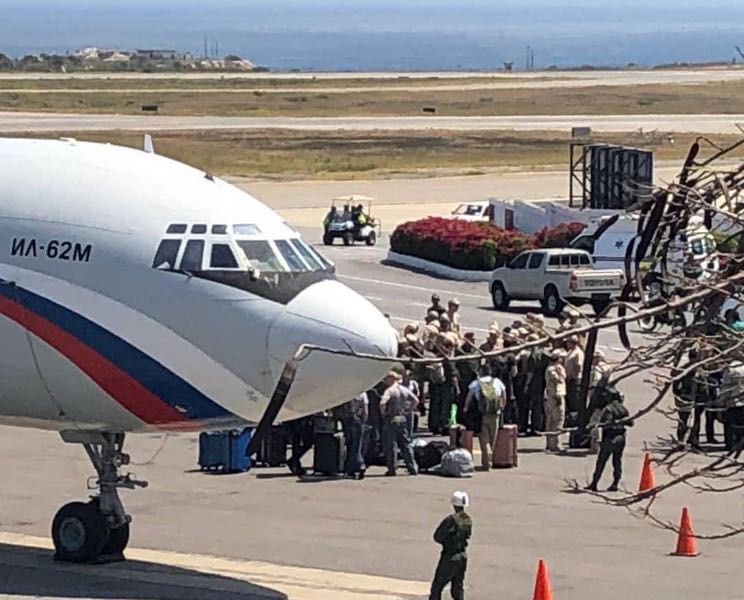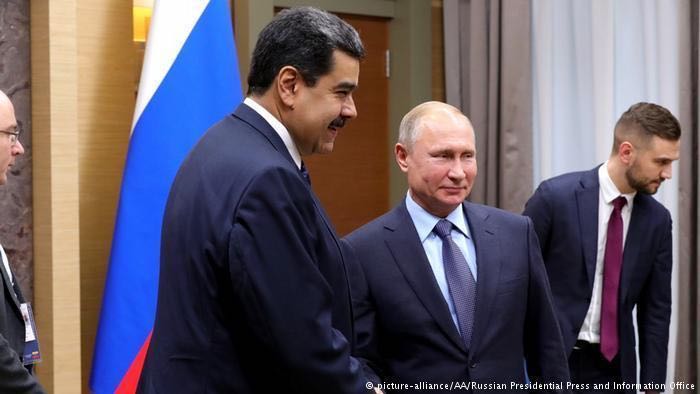For Russia challenging the US self-proclaimed 'sphere of influence' in Venezuela is a very cheap gamble, says our security expert Mark Galeotti. An airplane with armed men, a couple of threathening statements, flexing of some muscles is al that it costs the Russians. Rosneft investments in the Venezuelan oil industry could suffer. But that is probably an affordable loss and shrewd political calculation.
 Russian troups land in Caracas on March 24 on board an Ilyushin 62M (picture twitter)
Russian troups land in Caracas on March 24 on board an Ilyushin 62M (picture twitter)
As Washington ratchets up the pressure on Venezuela, Moscow’s defiant willingness to stand by Maduro’s unpleasant and oppressive regime is a new irritant in global relations. Yet in many ways it encapsulates Russia’s geopolitical approach, cheap bets on ultimate pragmatism.
In itself, Venezuela is not that important to Moscow. Rosneft in particular has invested heavily there, but it is an open question how far this inefficient state will ever represent a good return. Since 2010, Rosneft has poured more than $9 billion into Venezuela, but not only has it yet even to make good on its investment, hundreds of millions of dollars appear to have disappeared from the balance books, possibly embezzled in Caracas. But this was never an economic initiative but a political one, and Rosneft was once again operating as an arm of the Russian state, propping up a proxy ally. If anything, the prospect of disruptions in the Venezuelan oil industry might well drive up global prices in a way that would provide a much quicker and more evident profit than any bet on the honesty and efficiency of the current regime in Caracas.
Instead, Venezuela matters above all because it matters to Washington enough that it is involved, but probably not enough that it is truly willing to go all out to achieve its goals. As with Syria. Or Libya. Perhaps even Ukraine. These are the theatres where Moscow can see an easy opportunity to try and gain some leverage.
America's self proclaimed backyard
In a much-publicised move, perhaps a couple of hundred Russians, seemingly a mix of technicians, military special forces, mercenaries from the now-infamous Wagner Group, and cyber security specialists, were flown to Caracas at the end of March. A furious US government demanded they be withdrawn. Moscow refused.
So, now what? Moscow has claimed that it is willing to escalate, but there is a distinct limit to what it can or will deploy. Venezuela is a lot further than Syria, and besides this is not - yet, at least - a matter of fighting heavily-armed insurgents so much as of repressing protesters. Maduro has more than enough eavesdroppers, leg-breakers and sundry other thugs for that.
If the regime falls, as it may, then no one will be much surprised. Who could expect Moscow to be able to protect a regime that, frankly, even the Russians seem to regard with a degree of contempt for its mix of arrogance, brutality and corruption. Especially not within the USA’s self-proclaimed backyard, and facing a campaign of political pressure, subversion and isolation that seems almost calculated to prove Moscow’s own claims that ‘hybrid war’ is a Western, not a Russian invention.
 Putin and Venezolan president Maduro (picture Russian Presidential Press Office)
Putin and Venezolan president Maduro (picture Russian Presidential Press Office)
Nonetheless, the Russians will have proven that they are willing to defend their own, even against the Americans, and not be cowed by bluster and odds. The more Washington talks about its ‘own neighbourhood’ – as National Security Adviser John Bolton did on 1 May, warning that ‘This is our hemisphere; it’s not where the Russians ought to be interfering’ – the more it gives the Russians a chance to demand reciprocity in its own self-proclaimed sphere of influence.
Claim the credit
Yet if through luck, cunning or brutality the regime survives, then – rightly or wrongly – Moscow will be able to claim the credit. Look at us, they will say, we faced down the mighty Americans, on their own doorstep. This will be hailed as a triumph of Russian statecraft, of Russian will.
All this, with what is a very small commitment. A few gunmen, a few counter-hackers: this is a forward policy very much on the cheap, probably costing no more than a single day’s combat operations at the height of the Syrian war.
Washington seems genuinely surprised that Moscow is willing to be so assertive over Venezuela, so willing to risk its ire. The answer seems to be that Moscow has given up any real hope that it can gain anything concrete by being a good boy. As evident when it sat back and let US hammer Wagner at Deir ez Zor last year, it is not looking for direct military confrontations. But it has calculated that this American government (or, in fairness, probably any American government) is not looking for a Latin American Vietnam, or Iraq. It’s commitment to regime change is undeniable, but indirect and ultimately limited.
Moscow feels that it can exploit a ‘will gap’ that is less quantifiable than any disparities in economic strength or military power, but all the more important in a post-hegemonic age. One superpower is dead; another, China, is not yet truly awake; a third, the USA, is distracted, divided, and disinclined to pay the price in blood and treasure that empire demands.
In the meantime, Moscow’s belief in geopolitics as an arena for pragmatic and transactional politics, means it wants to engage in these intermediary theatres that matter enough, but not too much. Convinced that it is unlikely to gain any credit or concession from the West, or at least the US, by any retreat from its positions short of capitulation, instead it puts its faith in confrontation, in the hope that this will encourage its antagonists to strike deals. Even Washington’s willingness to talk directly to Moscow about developments in Latin America represents a success, a public acknowledgement that this country that Barack Obama characterised as a mere ‘regional power’ has a truly global role.
And all at a price of 300 personnel and some tough rhetoric. That’s a bargain.
